You know what’s really interesting about casino games? It’s not just random chance that determines what games are popular where. Think of it like this: when you walk into a casino in different parts of the world, you’re actually getting a peek into that culture’s soul.
Let’s take a closer look at how this plays out. In Macau, you’ll see packed baccarat tables where players huddle around, their energy almost electric. It’s fast, it’s dramatic, and it perfectly matches the region’s love for quick decisions and bold moves. Hop over to Monte Carlo, though, and you’ll find a totally different scene. Here, poker rooms are fille
Asian High Stakes Gaming Traditions
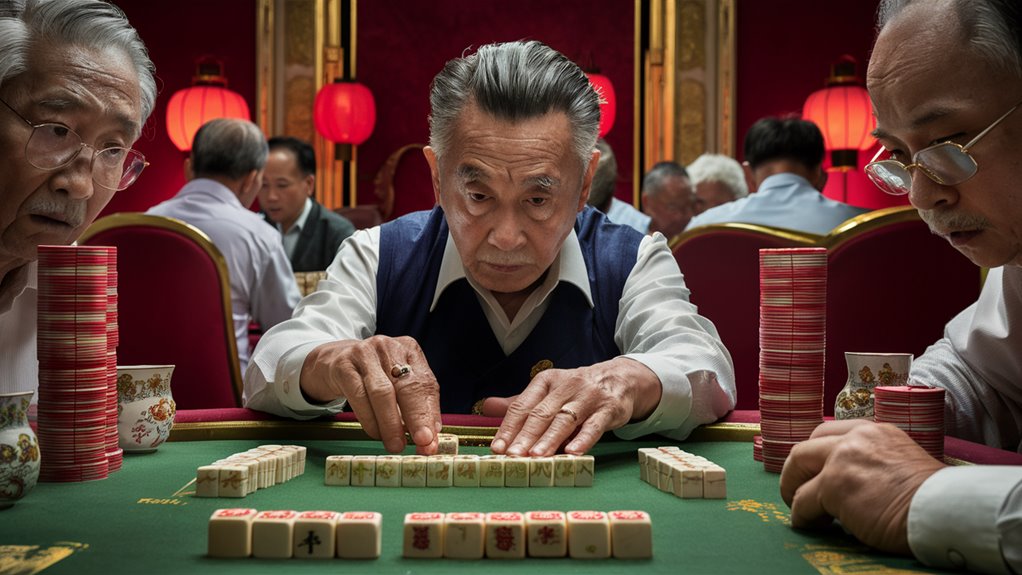
Let’s dive into the fascinating world of high-stakes gaming in Asia, where tradition and gambling intertwine in remarkable ways. You might be surprised to learn just how deeply these gaming customs are woven into the cultural fabric of many Asian societies.
Walk into any major casino in Macau or Singapore, and you’ll immediately notice something distinctive – baccarat tables dominate the floor. It’s not uncommon to see players casually wagering what many of us would consider a year’s salary on a single hand.
But here’s the thing: this isn’t just about the thrill of gambling. It’s deeply rooted in cultural beliefs about luck, fate, and the mystical power of numbers.
What’s really interesting is how Asian high-rollers approach their gaming. Rather than focusing on skill-based games like poker, they often gravitate toward games of pure chance.
You’ll spot players performing little rituals that might seem quirky to outsiders, like gently blowing on cards for good luck or carefully avoiding certain numbers considered unlucky. Traditional games like sic bo and pai gow still pull in huge crowds, probably because they offer that sweet spot between modern gambling and cultural heritage.
The casinos know their audience well. Step into one of their VIP rooms, and you’ll find yourself in a carefully crafted environment where every detail matters.
These spaces aren’t just fancy rooms – they’re designed with traditional feng shui principles in mind, complete with specific gaming etiquette and luxury amenities that cater to Asian preferences. It’s where serious players can bet millions while maintaining something incredibly important in Asian culture: face and social status.
European Sophistication in Casino Culture
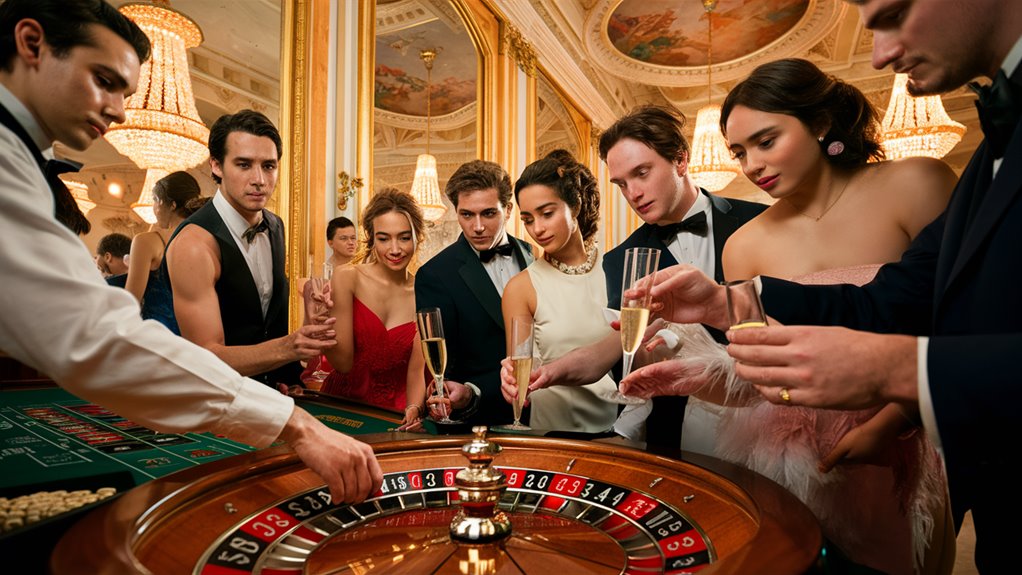
You know, there’s something truly special about European casino culture that sets it apart from the rest of the world. Think of it as the difference between a casual backyard barbecue and an elegant dinner party – both are fun, but they each have their own distinct vibe.
European players really gravitate toward games that make you think while keeping the social wheels turning. Take roulette and baccarat, for instance. These games weren’t born in just any old place – they came straight from the sophisticated salons of France and Italy, and boy, does it show.
Step into a European casino, and you’ll feel like you’ve entered another world entirely. The Casino de Monte-Carlo in Monaco is a perfect example.
It’s not just a gambling house, it’s practically a palace, with its stunning Belle Époque architecture and those famously strict dress codes. Don’t expect the bright lights and loud noises you might find elsewhere. Here, it’s all about quiet conversations and thoughtful gameplay.
What’s really interesting is how European players approach their gaming. They typically prefer to take their time, placing smaller bets and settling in for longer sessions.
It’s like they’re savoring a fine wine rather than taking quick shots. Card games like chemin de fer and trente et quarante are particularly popular, probably because they reward patience and skill rather than just luck.
This whole approach actually traces back to the European nobility, who saw casino games as more of a sophisticated pastime than a chance to strike it rich.
Even today, you can see this legacy living on in how European casinos prioritize good manners, clever strategy, and meaningful social connections. It’s less about the thrill of the win and more about the art of the game itself.
American Casino Entertainment Focus
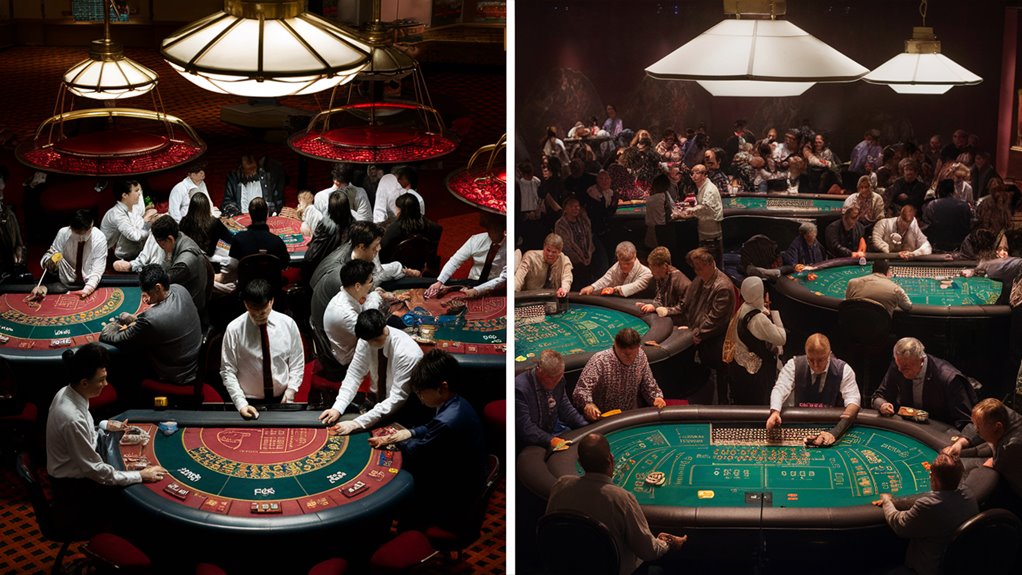
Let’s talk about what makes American casinos so unique.
You know how every country has its own casino
Social Gaming in Latin America
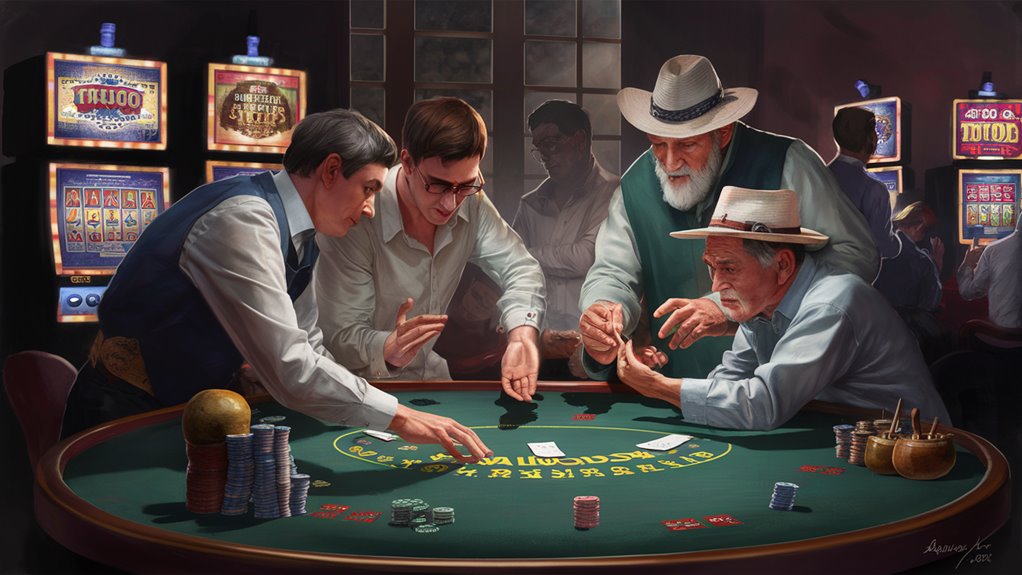
You know what’s fascinating about Latin American gaming culture? It’s all about coming together and having fun as a group. If you’ve ever stepped into a casino in Latin America, you’ll quickly notice it’s a whole different vibe from what you might be used to in other parts of the world.
Let’s talk about what makes these gaming spots unique. Picture this: instead of rows upon rows of slot machines, you’ll find lively table games where players chat, laugh, and celebrate together.
Bingo nights feel more like neighborhood gatherings, while poker tables buzz with friendly banter and competitive spirit.
What’s really cool is how these casinos blend traditional games with modern entertainment. Ever heard of Truco or Buraco? These beloved Latin American card games have found their way onto casino floors, bringing a authentic local flavor to the gaming experience.
It’s like having a piece of home right there at the table.
The social aspect goes way beyond just playing games. On any given night, you might stumble upon a tournament that feels more like a community festival.
There’s often live music playing in the background, and between games, players hang out in vibrant dining areas, sharing stories and strategies over local dishes.
Think of Latin American casinos as social hubs where gaming is just part of the bigger picture. It’s not uncommon to see people spending an entire evening there, moving from table to table, making new friends, and soaking in the atmosphere.
The experience is less about winning big and more about enjoying good company and creating memorable moments together.
Tribal Gambling Across World Regions
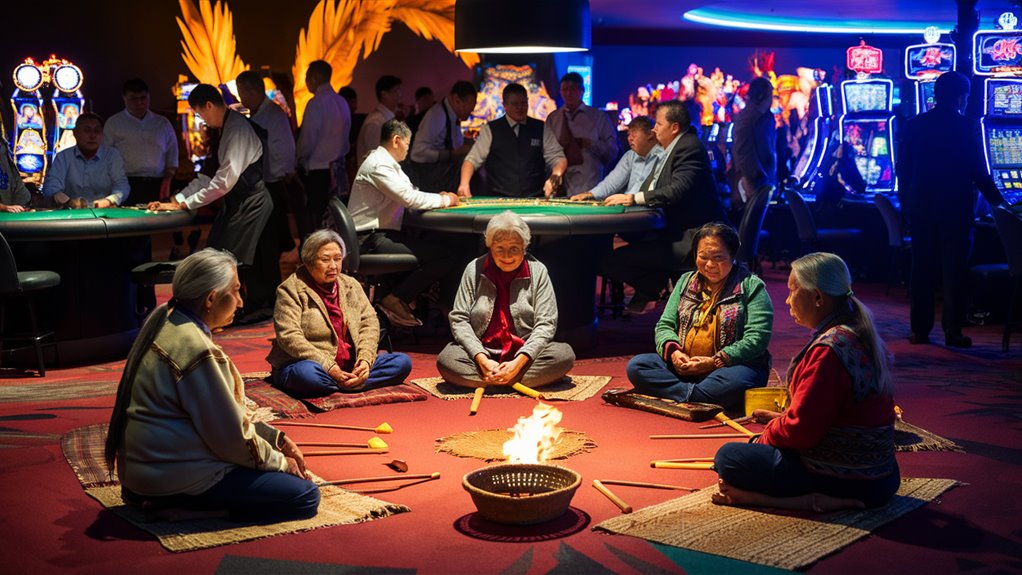
Let’s talk about how indigenous gambling has shaped casino culture worldwide. You know, it’s fascinating to see how traditional gaming practices have evolved into modern-day casino operations across different continents.
Take Native American tribal casinos, for instance. These aren’t just your typical gambling spots – they’ve become cultural landmarks that blend traditional values with contemporary entertainment. In the United States, tribal nations have transformed their gaming heritage into some of the most successful casino operations you’ll find anywhere.
What’s really interesting is how these gaming traditions vary from region to region. While North American tribes have built massive resort-style casinos, indigenous communities in Australia tend to run smaller, more intimate gaming venues that reflect their local customs and community needs.
The cultural elements really shine through in these places. You might notice traditional artwork adorning the walls, local cuisine in the restaurants, or even architectural designs that pay homage to tribal heritage. It’s not just about placing bets – it’s about preserving and celebrating indigenous culture while creating economic opportunities for their communities.
These casinos have become more than just gaming centers. They’re cultural bridges that help visitors understand and appreciate indigenous traditions while enjoying modern entertainment. Whether you’re visiting a sprawling tribal resort in Connecticut or a small gaming house in the Australian outback, you’ll find unique blends of ancient traditions and contemporary casino culture.
Common Questions
How Do Gambling Age Restrictions Vary Across Different Cultural Regions?
Let’s talk about gambling age restrictions around the world, because they’re actually pretty fascinating when you look at them closely. You’ll find quite a range of minimum ages depending on where you are. Most European countries have settled on 18 as their magic number, while the United States typically goes with 21, though this can vary by state and type of gambling.
In Asia, the rules get even more interesting. Thailand sets the bar at 20, while Japan allows certain forms of gambling at 18. Some countries take a much stricter approach – several Middle Eastern nations have completely banned gambling, making the age requirement a moot point.
What’s really interesting is how these restrictions often reflect local cultural values and social norms. Think about it: places with more conservative values tend to have higher age limits or outright bans, while regions with more relaxed attitudes often set lower age requirements.
And here’s something you might not know – even within countries, the rules can change depending on what type of gambling we’re talking about. You might be able to buy a lottery ticket at 18 but need to wait until 21 to hit the casino floor. It’s kind of like how different countries have different drinking ages, each setting limits based on their own cultural perspective of what constitutes responsible adult behavior.
What Role Does Religion Play in Shaping Regional Attitudes Toward Gambling?
Let’s talk about how religion shapes people’s views on gambling. You know how different faiths can influence the way we think about things? Well, gambling is a perfect example of this in action.
When it comes to religious perspectives on gambling, it’s fascinating to see how varied they can be. Take Islam and conservative Christianity, for instance. These faiths typically take a pretty firm stance against gambling, viewing it as morally questionable or even outright harmful to society and family values.
On the other hand, Buddhism and Hinduism tend to have more nuanced approaches. Some Buddhist communities might be okay with casual gaming, while others see it as a distraction from spiritual growth. Similarly, Hindu attitudes can vary quite a bit depending on local customs and specific interpretations of religious texts.
It’s really interesting how these religious beliefs filter down into everyday life, right? You might notice that areas with strong religious influences often have stricter gambling regulations, while more secular regions tend to be more permissive. Think about Las Vegas versus, say, parts of the Middle East – the contrast couldn’t be more striking!
Of course, individual attitudes don’t always perfectly match religious teachings. You’ll find plenty of people who identify with a particular faith but have their own personal take on whether placing a friendly bet is acceptable or not.
How Do Currency Exchange Rates Impact International Casino Gaming Preferences?
Let’s talk about how currency exchange rates shape our gambling choices when traveling abroad. You know how sometimes your money seems to stretch further in certain countries? Well, the same principle applies to casino gaming.
When exchange rates work in your favor, you might find yourself more willing to try your luck at international casinos. Think of it this way: if your home currency is particularly strong against the local one, those $100 poker buy-ins might actually cost you less than they would back home. Pretty tempting, right?
On the flip side, unfavorable exchange rates can really put a damper on your gaming plans. Nobody wants to feel like they’re paying double just to get in on the action. You’ll probably find yourself being more cautious, sticking to smaller bets, or maybe even choosing to watch from the sidelines.
Interestingly, when local currencies are strong, many players gravitate toward high-stakes tables. It makes sense, really. If you’re a tourist from a country with a weaker currency, you might feel more comfortable placing larger bets in a casino where the chips represent less of your actual money. Just remember to keep track of the real value, though, as those conversions can sometimes be tricky in the heat of the moment.
Which Casino Games Have Been Banned in Specific Cultures and Why?
You know, it’s fascinating how different cultures have taken strong stances against certain casino games throughout history. Take China, for instance. During the Cultural Revolution, the popular game of Mahjong faced a complete ban, despite being deeply woven into Chinese social fabric for centuries. The government saw it as a symbol of old traditions they wanted to eliminate.
Moving over to South Korea, we find strict regulations around pachinko, a game that sits somewhere between pinball and slot machines. While incredibly popular in neighboring Japan, South Korean authorities have long restricted it, mainly due to concerns about gambling addiction and its ties to organized crime.
Brazil takes an interesting approach when it comes to slot machines. These colorful, chiming gaming devices are strictly off-limits, and there’s actually a pretty complex story behind this ban. The decision stems from a mix of religious values, worries about gambling addiction, and broader social concerns about the impact on families and communities.
What makes these bans particularly intriguing is how they reflect each society’s unique values and challenges. Some restrictions came from moral standpoints, others from social pressure, and quite a few from governments
How Do Seasonal Festivals Influence Gambling Patterns in Different Regions?
You know what’s fascinating about 온라인카지노 플레이 전략 gambling patterns? They really come alive during major festivals around the world. Take Chinese New Year, for instance – the casinos in Macau and Singapore get absolutely packed as people celebrate with traditional games like mahjong and try their luck at the tables. It’s pretty